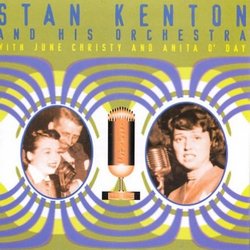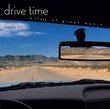| All Artists: Stan Kenton Title: Stan Kenton on A.F.R.S. 1944-1945 Members Wishing: 1 Total Copies: 0 Label: Status Records Release Date: 5/20/1996 Genres: Jazz, Pop, Broadway & Vocalists Styles: Swing Jazz, Traditional Jazz & Ragtime, Orchestral Jazz, Easy Listening, Oldies, Traditional Vocal Pop Number of Discs: 1 SwapaCD Credits: 1 UPCs: 5019317101923, 5019317101947 |
Search - Stan Kenton :: Stan Kenton on A.F.R.S. 1944-1945
 | Stan Kenton Stan Kenton on A.F.R.S. 1944-1945 Genres: Jazz, Pop, Broadway & Vocalists
|
Larger Image |
CD DetailsSimilar CDs |
CD ReviewsA Rare Glimpse of Stan ayer | Cleburne, TX United States | 12/28/2000 (4 out of 5 stars) "These CD tracks are from two broadcasts dated 27 November 1945 and 6 December 1944. They represent an orchestra in transition, pre-dating the major Pete Rugulo influence and post-dating the original Balboa band of 1940. The 1944 broadcast was for the Downbeat AFRS radio program and consists of studio recordings dubbed into a live presentation by Stan and John Tillman. Russian Lullaby is the first tune, and is a powerful Joe Rizzo chart. Rizzo was with Stan during the Balboa period, and uses deep saxophone voicings, tempo changes, and excellent counterpoint throughout. A young Stan Getz is featured here, and this recording shows him far removed from his later "cool" mode. It is reported that when Stan first heard this chart by Rizzo (who was in the Army) he asked, "What are they feeding you, raw meat?" Ride On is a Charlie Shirley arrangement and features Anita O'Day on the vocal. Shirley was a adept arranger in the Kenton fashion with staccato passages, chromatic substitutions, and powerful brass (although this band had 4 trumpets and 4 trombones). The Very Thought of You is the band's Achilles heel, in that the clarinet lead in the reeds just doesn't blend in the intended Miller style. Gene Howard's vocal gets off to an unfortunate start as well. Our Waltz is in a similar vein, but is performed quite well, including Stan's piano. Wisely, clarinet lead voicings were on the way out for Stan's later bands. Balboa Bash was an attractive and early Yaw piece for the Balboa band, but was updated to reduce (not eliminate) the staccato and syncopation effects of the early Kenton stlye. Boots Mussulli takes the solo honors on alto in the Willie Smith style. Boots would prove to be a major Kenton soloist for the next 3 years. I Know That You Know is another Rizzo powerhouse chart featuring a tenor duel between Emmett Carls(formerly with Boyd Raeburn) and Getz in that order. In a Little Spanish Town is a bit unnerving with the faux latin rhythm, and is a mediocre Dave Matthews arrangement. The arragement Man I Love is credited to Mussuli, but its lack of melody line together with the Willie Smith influence on Boots doesn't really work out, save for the nice final cadenza. Conversin' with the Brain on the other hand is a fine Mussulli arrangement in the Kenton style, providing nice solo opportunities for Karl George on trumpet, Getz, and Mussulli. The closing tune is a bit-too-fast And Her Tears Flowed Like Wine, a million-selling novelty tune arranged by Buddy Baker. The above tunes together represent the fact that Stan's band was above all an arranger's band, yet unhindered by the more far-out excesses of his Innovations orchestra of the late 40's. By the time of the 1945 broadcast from the Hollywood Palladium, Stan's band had improved considerably with the addition of Eddie Safranski on bass, Vido Musso and Bob Cooper on tenors, Ralph Collier (his brother Earl had played with the Balboa band) on drums, and the legendary Ray Wetzel on lead trumpet. Only eight musicians remained from the 1944 broadcast, and June Christy replaced Anita. Only a musician of Stan's calibre could find a singer to replace O'Day, and June shines on this broadcast. Collier is a much-underrated drummer, as he helped put the band on top before the arrival of Shelley Manne, and improved the rhythm section along with Safranski. Artistry Jumps features Musso on some over-the-top soloing and Collier in an unusual drum solo at the close, unlike the studio version. We'll Be Together Again features Gene Howard, and the tune has some beatiful harmonies and sensitive obbligato solos by Musso and Mussulli. I Don't Want To Be Loved is a striking Gene Roland chart, having more of a 50's band sound, and a simply high energy level that illustrates why Kenton's band was on top by late 1945. Roland strikes again with It's Only A Paper Moon, and Gene Howard contributes very nicely here. Roland's intro alone is worth a listen. Body and Soul is a nice Musso and Collier feature. Musso's extended solo provides aural evidence of Musso's popular and powerful soloing. Painted Rhythm is a nice Kenton arrangement, and Roland again takes arranging honors with Ellington's Just A-Sittin' A-Rockin', wherein June Christy sings a little more than in the Capitol release. Stan's solo is outstanding, as well as some asides by Musso. Eager Beaver is shortened a bit, yet it surprises with a Bob Cooper solo in the original Red Dorris vein. After Musso left the band, the world found out how brilliant Cooper really was when he was assigned more solo opportunities. All things considered, this CD shows Stan as the leader of an exciting band at the leading edge."
|

 Track Listings (22) - Disc #1
Track Listings (22) - Disc #1